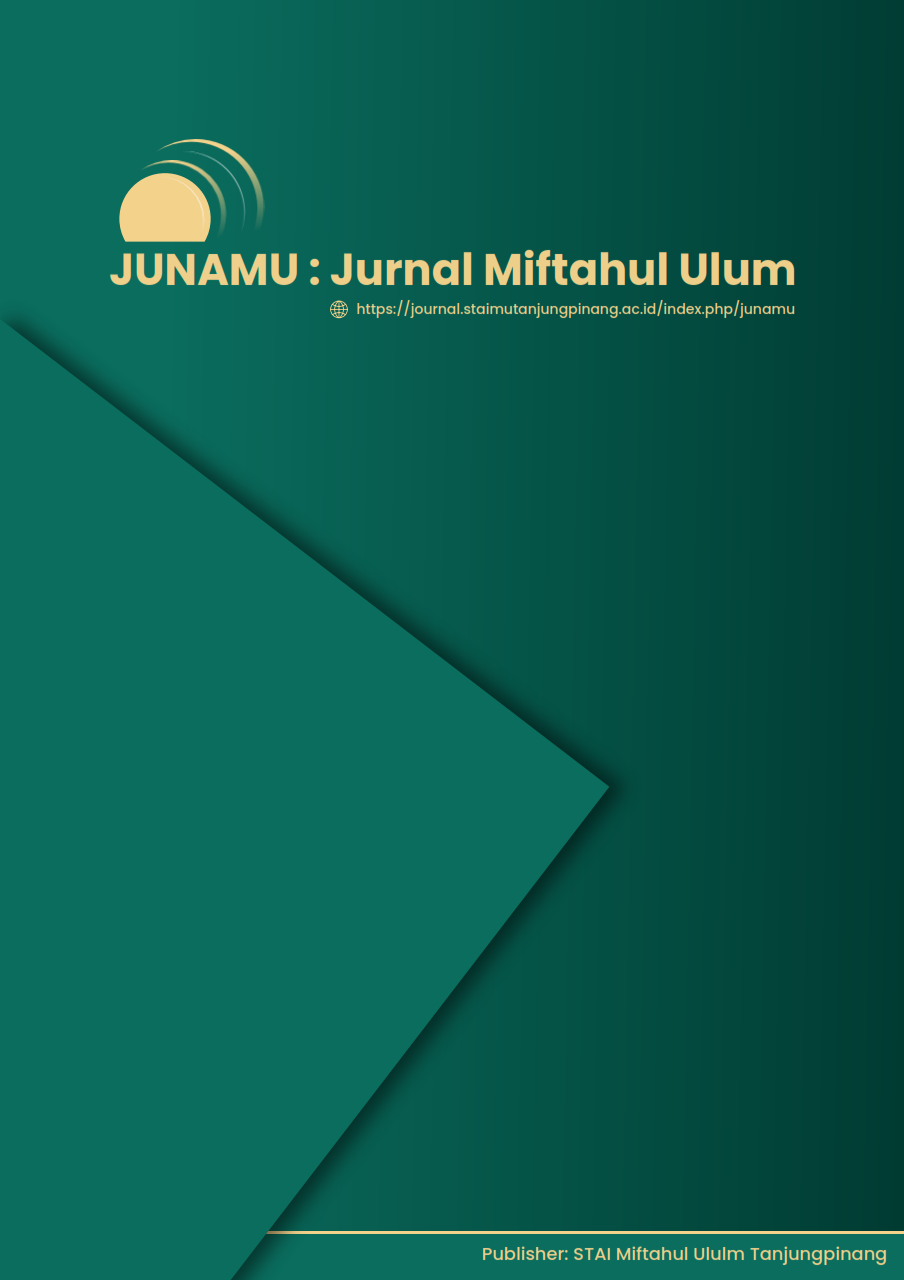PEMIKIRAN – PEMIKIRAN KOMPERATIF MAHMUD YUNUS DAN AMIN ABDULLAH DALAM BIDANG PENDIDIKAN ISLAM
Abstract
In education, there are many Islamic figures who have great influence and they are Ibn Sina, Ibn Khaldun, Al-Kindi, Al-Khwarizmi, Al-Ghazali, Prof. Dr. H. Mahmud Yunus, Amin Abdullah etc. The large number of Islamic education figures who have emerged have had a very significant influence on the development of Islamic educational institutions and this can be clearly seen from the many innovations that have emerged and reforms which are of course very beneficial for the world of education, especially Islamic education in Indonesia. However, of the several figures mentioned above, all of whom are very important figures in the science of education, this research only focuses on Islamic educational thought, two of which are Islamic educational thought according to Mahmud Yunus and Amin Abdullah. Meanwhile, according to Mahmud Yunus's thoughts, Islamic education is intellectual education, moral education and community education. The concept of Islamic education from Mahmud Yunus's perspective is education that seeks to produce people who are ethical, moral and have noble character, and have knowledge and skills in the field of general knowledge. Meanwhile, according to Amin Abdullah, integration- interconnection departs from the conception that Islam develops knowledge that is universal and does not recognize the dichotomy between qauliyyah/hadhârah al nash sciences. In other words, the relationship between existing Islamic education, both in the realm of hadharat an-nash, hadharat al-ilm, and hadharat al-falsafah, needs to be seen from the perspective of dialogue or even integration. Therefore, Islamic education, as emphasized by M. Amin Abdullah, is closely related to the practical- social dimension, because it always has a social impact and is required to be responsive to social reality so that it is not limited to the scope of theoretical- conceptual thinking as understood during This. Amin Abdullah teaches religious education and general education, namely through an integration-interconnection approach, with no separation between the two education models. He believes that science must unite and interact within the scope of scientific dialogue. Islamic education must be able to connect all learning materials both in the preparation process, both in the implementation and learning process in the classroom and outside of learning. The concept of Islamic education, according to Amin Abdullah and also Mahmud Yunus, is still very relevant to be implemented today and this is proven by the existence of universities and schools in Indonesia that still apply the concept of thought.
References
Abdullah, M. Amin. (1999). “Visi Keindonesiaan Pembaharuan Pemikiran Islam Hermeneutik”, Epistema, No. 02
Abdullah, M. Amin. (2001). Filsafat Ilmu-ilmu Keislaman: Kajian Pendahuluan, dalam Seminar Nasional Pengujian Teori, STAIN Kudus, 12 Maret.
Abdullah, M. Amin. (2005). Membangun Kembali Filsafat Ilmu-Ilmu Keislaman: Tajdid dalam Perspektif Filsafat Ilmu, dalam M. Amin Abdullah, Tajdid Muhammadiyah untuk Pencerahan Peradaban. Yogyakarta: MTPPI dan UAD Press.
Abdullah, M. Amin. (2002). Al-Takwin al-‘Ilmiy: Ke Arah Perubahan Paradigma Penafsiran Kitab Suci, dalam M. Amin Abdullah, dkk. Tafsir Baru Studi Islam dalam Era Multi Kultural. Yogyakarta, Panitia Dies IAIN Sunan Kalijaga Yogyakarta ke-50,tahun 2001 dengan Kurnia Kalam Semesta.
Abdullah, M. Amin. (2006). Islamic Studies di Perguruan Tinggi: Pendekatan Integratif- Interkonektif, Yogyakarta: Pustaka Pelajar.
Abdullah, M. Amin. (2007). “Desain Pengembangan Akademik IAIN Menuju UIN Sunan Kalijaga: Dari Pendekatan Dikotomis-Atomistis Kearah Integratif-Interkonektif” dalam Fahrudin Faiz, (ed.), Islamic Studies dalam Paradigma Integrasi-Interkoneksi. Yogyakarta: SUKA Press.
Azra, Azyumardi, (2003). Surau; Pendidikan Islam Tradisional dalam Transisi dan Modernisasi, Cet. I; Ciputat: Logos Wacana Ilmu.
Islmail Raji al-Faruqi, (1982). Islamization of Knowledge: General Principles and Workplan. Herndon, VA: International institute of Islamic Thought.
Mahmud Yunus, (1995). Riwayat Hidup Prof. Dr. Mahmud Yunus, Jakarta: Hidakarya Agung, cet. 1.
Mahmud Yunus, (1997). Pengembangan Pendidikan Islam di Indonesia, Jakarta: Hidakarya Agung, Cet.I..
Mahmud Yunus, (2001). Sejarah Pendidikan Islam di Indonesia, Jakarta: Mutiara, Cet.ke-4.
Mahmud Yunus, (1978). Pokok-pokok Pendidikan dan Pengajaran, Jakarta: Hidakarya Agung, Cet. Ke-2.
Mahmud Yunus, (1990). Metodik Khusus Pendidikan Agama, Jakarta: Hidakarya Agung, Cet.ke- 1.
Mustika zed, (2001). Riwayat, Padang:Angkasa Raya.
Nata, Abuddin. (2005). Tokoh-tokoh Pembaharuan Pendidikan Islam di Indonesia, Jakarta: Radja Grafindo Persada.
Samsul Nizar, (1995). Pengantar Dasar- dasar Pemikiran Pendidikan Islam, Jakarta: Gaya Media Pratama







